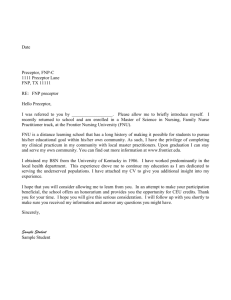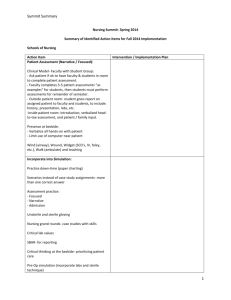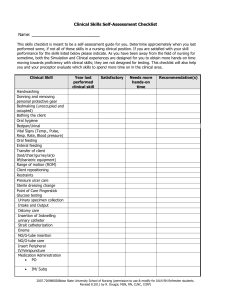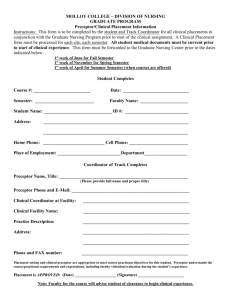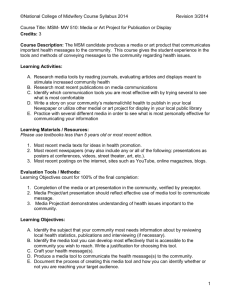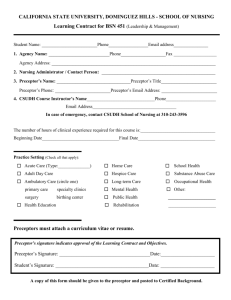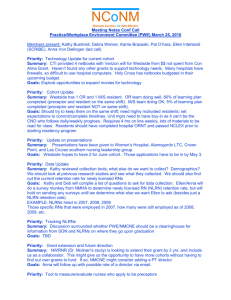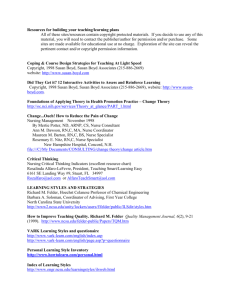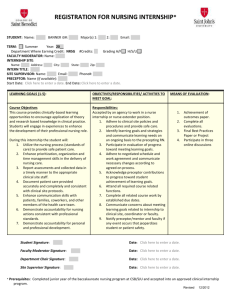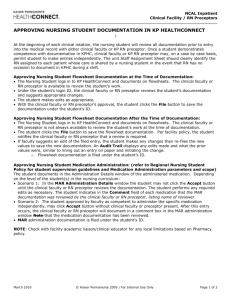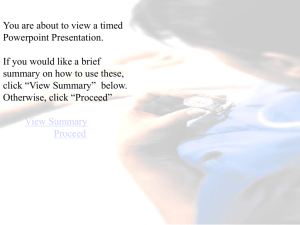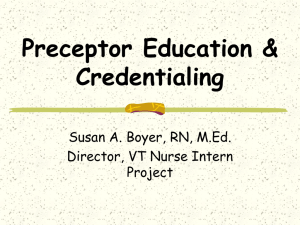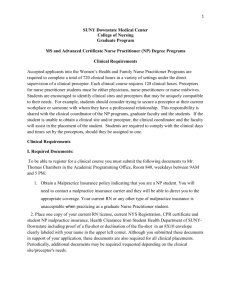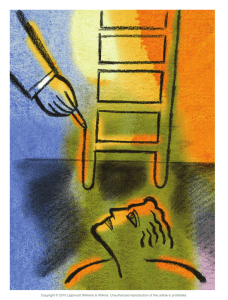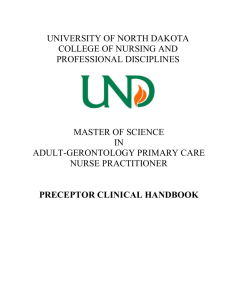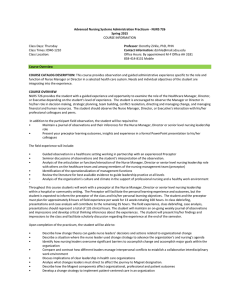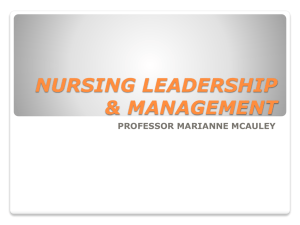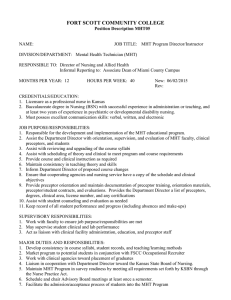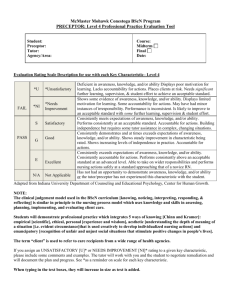Guidelines for students
advertisement
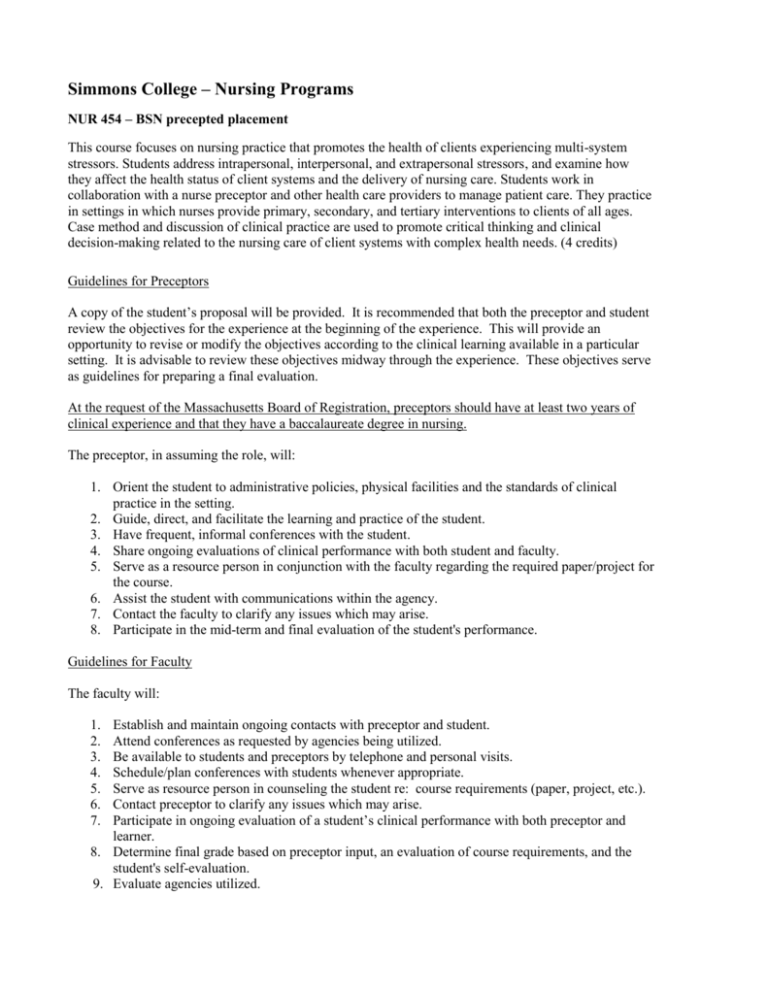
Simmons College – Nursing Programs NUR 454 – BSN precepted placement This course focuses on nursing practice that promotes the health of clients experiencing multi-system stressors. Students address intrapersonal, interpersonal, and extrapersonal stressors, and examine how they affect the health status of client systems and the delivery of nursing care. Students work in collaboration with a nurse preceptor and other health care providers to manage patient care. They practice in settings in which nurses provide primary, secondary, and tertiary interventions to clients of all ages. Case method and discussion of clinical practice are used to promote critical thinking and clinical decision-making related to the nursing care of client systems with complex health needs. (4 credits) Guidelines for Preceptors A copy of the student’s proposal will be provided. It is recommended that both the preceptor and student review the objectives for the experience at the beginning of the experience. This will provide an opportunity to revise or modify the objectives according to the clinical learning available in a particular setting. It is advisable to review these objectives midway through the experience. These objectives serve as guidelines for preparing a final evaluation. At the request of the Massachusetts Board of Registration, preceptors should have at least two years of clinical experience and that they have a baccalaureate degree in nursing. The preceptor, in assuming the role, will: 1. Orient the student to administrative policies, physical facilities and the standards of clinical practice in the setting. 2. Guide, direct, and facilitate the learning and practice of the student. 3. Have frequent, informal conferences with the student. 4. Share ongoing evaluations of clinical performance with both student and faculty. 5. Serve as a resource person in conjunction with the faculty regarding the required paper/project for the course. 6. Assist the student with communications within the agency. 7. Contact the faculty to clarify any issues which may arise. 8. Participate in the mid-term and final evaluation of the student's performance. Guidelines for Faculty The faculty will: 1. 2. 3. 4. 5. 6. 7. Establish and maintain ongoing contacts with preceptor and student. Attend conferences as requested by agencies being utilized. Be available to students and preceptors by telephone and personal visits. Schedule/plan conferences with students whenever appropriate. Serve as resource person in counseling the student re: course requirements (paper, project, etc.). Contact preceptor to clarify any issues which may arise. Participate in ongoing evaluation of a student’s clinical performance with both preceptor and learner. 8. Determine final grade based on preceptor input, an evaluation of course requirements, and the student's self-evaluation. 9. Evaluate agencies utilized. Guidelines for students: Work under direct supervision of the nurse assigned to the patient. Adhere to the professional standards of nursing practice. Demonstrate cultural sensitivity and competence in client interactions. Use therapeutic communication techniques in working with clients Apply the principles of collaboration when working with all members of the multidisciplinary team. Develop nursing care plans for clients using functional health pattern assessments, nursing diagnoses, interventions and evaluations. Apply teaching-learning theory to client education. Discuss the principles of ethical decision making. Demonstrate knowledge of basic nursing skills in accordance with policies and procedures of the Agency to include the following: Physical assessment Vital signs AM care Skin care Positioning Transferring Ambulating Ostomy and stoma care Urinary catheter insertion Condom catheter application Enema administration Urine, stool and blood glucose testing Chest tube care Sputum collection O2 saturation measurements Oxygen administration via nasal cannula, face mask, nebulizer Dry sterile dressing Wet moist dressings Nasogastric tube care Gravity and pump tube feedings Care of urinary drainage Care of gastrostomy tubes Care of jejunostomy tubes Activities that the students are not allowed to perform During this RN transition experience students are not permitted to perform any of the following: IV venipuncture to draw blood Hang blood or blood product Administer IV push medications EXCEPT UNDER DIRECT SUPERVISION Start intravenous lines unless certified by the clinical institution Ambulance transport under ANY conditions regardless of mentor or other staff presence on transport
